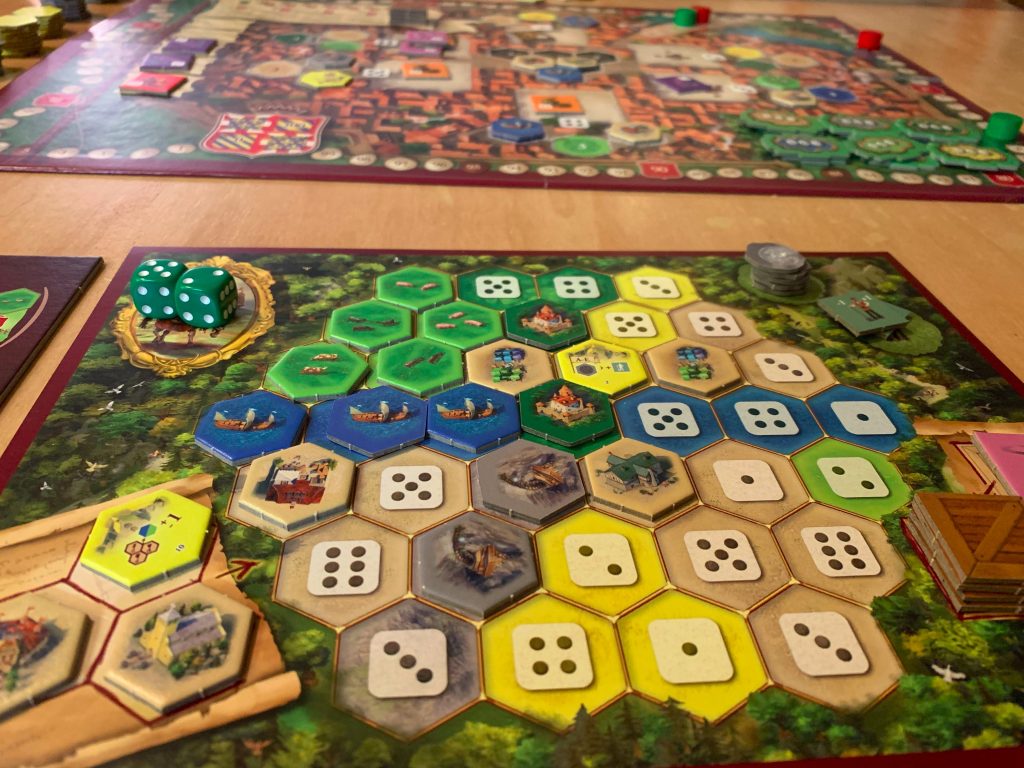This is the second post in a short series about why the Stubborn household has made playing games a priority in our home. If you missed the first one, check it out here.
The second reason that we have chosen to make playing games a priority in our household is that tabletop games, weather they are card games, deck builders, heavy strategy games, word games, or simple roll and play, are uniquely suited to challenging our minds to grow in a variety of different skills.
I wrote about our daughter, Miss A’s, challenges with early learning of math and language concepts and you can find that story in chapter 5 of the book 8 Great Smarts for Homeschoolers by Tina Hollenbeck. In that story I lay out how we discovered that through playing games filled with logic and language we were able to unlock our daughter’s smarts to help her become a successful learner.
Well, it goes way beyond our daughter’s education alone. As discussed in the previous post of this series, when we play games together it fosters a sense of connection that is deep and rich. That connection leads to the opportunity to learn and grow together.
Are you ready for this shocker? I don’t let my kids win. Nope. Does not happen in this house. Now, when I am playing with my youngest, I might not make the absolutely most ruthless move possible, but I definitely don’t throw my turns. The reason for this is that we believe that genuine challenge and competition is really important for stretching those brain muscles. If there is no genuine challenge, there is not much motivation to do your best. A second reason is that my children are fully capable of defeating me at almost any game on their own merits. They have incredible young, pliable, smart minds that come up with amazing strategies to eviscerate their mother and father all on their own.
So what games are best for brain-stretching? For building those logical and puzzle-solving connections? All of them.

Okay, I can be more specific. Every game has some sort of puzzle that needs to be solved in order to be successful. Now of coarse, heavy strategy games (think Risk) require a different level of strategy brain power to get a win, but Out Foxxed has logical and deductive benefit that is just as worthwhile, especially for young minds. Do you know what it feels like when you lift something too heavy when you weren’t prepared and you pull a muscle? Yeah, that happens in our minds too. It’s great to warm-up with learning how to think through simple games that build those logical connections before tackling the heavy games. The benefit is just as rich.
And then there are the word games, and the guessing games, and even the luck-based games like Yahtzee. Each of these types of games engages our minds in different ways to grow different skills. They are all valuable.
One of the things that I absolutely love about homeschooling my children is that I get the opportunity to learn right alongside my children. I was raised pretty eclectically by parents who encouraged me to learn and grow in many different areas. I have always been strong in my language skills, but my father especially encouraged me to grow in mathematics, logic, and the sciences. Those don’t come as naturally to me, but because of my father’s influence I have never been afraid to stretch myself in those areas. And then I married a man who is my equal linguistically, but is also extremely gifted in mathematics and logic. We have fun playing games together because we love to challenge each other. We aren’t afraid of each other’s gifts, although I have vowed that I will never play Risk with him. He loves seeing my logic skills grow, and I enjoy seeing him really play a good game and then loose graciously Haha.
All of my sons at home have their favorite types of games. Mr. B likes logic games, but struggles with resource management, so games where there are choices about what to spend and when are great brain-stretchers for him. Mr. E and Mr. D are both extremely logic smart, but because they are very busy boys, they are challenged in games where their logic has to play out in a longer game and they don’t necessarily see immediate gratification. Ms. A continues to blow us away with her prowess at learning very in-depth games very quickly and being able to hold all the mechanics in her head. Now that she is reading better, she is really a force to be reckoned with in any game that she tackles. It is such an incredible privilege to be able to witness these moments of growth in all of my children. It’s the best part of gameschooling.

